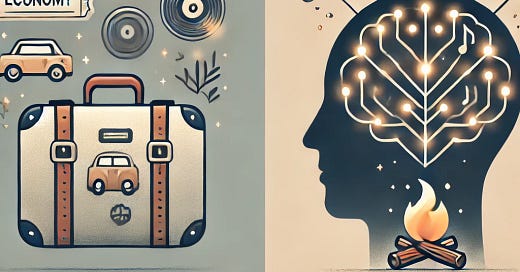The "Experience Economy": Why We're Buying Memories, Not Just Stuff
Think back to the best concert you’ve attended, a life-changing vacation, or a spontaneous road trip with friends. Chances are, these experiences bring a smile to your face and occupy a special place in your memory. Compare that to the latest gadget or trendy item you purchased—how often does it cross your mind now?
Welcome to the experience economy, where people increasingly prioritize spending money on experiences rather than material possessions. This cultural and economic shift is reshaping industries and how we think about value and happiness.
Why the Shift Toward Experiences?
The movement toward prioritizing experiences over material goods is driven by several factors:
The Rise of Social Media
Platforms like Instagram and TikTok have transformed how we share our lives, creating a culture of “experience envy.” People love posting photos and videos of their travels, concerts, and unique adventures, reinforcing the appeal of experiences over things.A Desire for Connection
Experiences often involve other people—friends, family, or even strangers. Whether it’s a dinner with loved ones or attending a festival with thousands of others, these shared moments foster deep bonds and lasting memories.The Search for Meaning
In a world where material goods are abundant and often disposable, people are seeking more fulfilling ways to spend their money. Experiences often provide a sense of purpose, discovery, and personal enrichment that physical items can’t replicate.Shifting Demographics and Priorities
Millennials and Gen Z, in particular, have embraced the experience-first mindset. Surveys show that these generations overwhelmingly value experiences over possessions, citing the desire for personal growth, adventure, and meaningful social interactions as top reasons.
The Economic Impact
The experience economy is not just a cultural trend; it’s a major economic force, reshaping industries and consumer behaviors:
Travel and Tourism
The travel industry has experienced explosive growth as people seek authentic adventures, cultural immersion, and “bucket list” destinations. Experiences like eco-tourism, adventure travel, and wellness retreats are now multibillion-dollar markets.Entertainment and Leisure
Events like concerts, music festivals, and live sports are thriving. For instance, Coachella and similar festivals attract hundreds of thousands annually, generating millions in revenue and spurring growth in local economies.Food and Dining
The dining industry has evolved far beyond eating for sustenance. Pop-up restaurants, chef’s table experiences, and food tours are booming, as diners crave unique culinary adventures rather than just a meal.Personal Development
People are increasingly spending on experiences that enhance their skills, well-being, and self-awareness. From yoga retreats and professional workshops to online courses and creative bootcamps, the personal growth industry is flourishing.
Investing in Experiences
While experiences may not leave you with a physical object, they provide a different type of return on investment—one that enhances life in meaningful ways:
Unforgettable Memories
Experiences become part of your story. Memories of adventures, laughter, and even challenges stick with you, enriching your life in ways a new gadget can’t.Personal Growth
Travel, learning experiences, and stepping outside your comfort zone broaden your perspective and teach you about the world—and yourself. A solo trip, for example, can build confidence and independence, while a cooking class might ignite a new passion.Stronger Relationships
Shared experiences create lasting bonds. Whether it’s a group trip, a date night, or attending a workshop together, experiences bring people closer.Increased Happiness
Studies consistently show that spending money on experiences leads to greater long-term happiness than buying material goods. Experiences often bring anticipatory joy (planning and looking forward to them), moments of peak happiness during the event, and fond memories afterward.
Why Experiences Matter More Than Ever
The pandemic underscored the importance of meaningful experiences. With lockdowns and restrictions, many people realized how much they missed traveling, dining out, and connecting with others. As the world reopened, the desire to “make up for lost time” has only accelerated the trend toward prioritizing experiences.
Moreover, research suggests that this shift could lead to more sustainable consumer behavior. Unlike material goods, experiences don’t contribute to physical waste or overconsumption, making them a potentially eco-friendlier choice.
Additional Resources for Exploring the Experience Economy
"The Experience Economy" by B. Joseph Pine II and James H. Gilmore: A foundational book exploring the rise of experiences as economic drivers.
Airbnb Experiences: A platform offering unique activities hosted by locals, from cooking classes to guided tours.
Eventbrite: Find live events and experiences near you, from workshops to concerts.
National Geographic Travel: Inspiration and resources for planning meaningful travel experiences.
The Takeaway
The experience economy reminds us that life isn’t just about accumulating things—it’s about creating moments that matter. Experiences don’t just enrich our lives; they help us grow, connect, and find happiness in ways that material possessions cannot.
So, the next time you’re debating between buying something or doing something, consider what will bring you lasting joy. In a world increasingly focused on living fully, the best investment might just be in the memories you make.





